Lawmakers Criticize Iranian Carmakers For Low Quality, High Prices
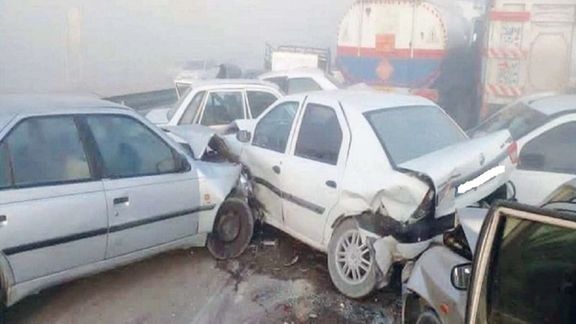
Parliament speaker Mohammad Bagher Ghalibaf has criticized the quality of Iranian cars and called for more imported vehicles.

Parliament speaker Mohammad Bagher Ghalibaf has criticized the quality of Iranian cars and called for more imported vehicles.
In a parliamentary discussion Saturday, Ghalibaf said that “a car with good quality can be imported” for $5,000 whereas the Iranian version of a Kia Pride, the cheapest and most popular car on the market, costs about around $8,000 (2 billion rials). But it is the parliament and the government, controlling foreign currency, who have not approved additional car imports.
Since the United States introduced ‘maximum pressure’ sanctions in 2018, threatening third parties dealing with the Iranian financial sector, Iran has struggled with imports, while European carmakers in joint projects have withdrawn.
Iranian automakers are also quasi-governmental companies, benefitting from favorable borrowing and lack of competition. Some media in Iran have speculated that this vested interest might have a role in blocking approval for imports.
Parliamentarian Ali Babai Karnami bemoaned an “unrestrained situation” in the car industry. “Who is responsible for the rising car prices?” he asked. “What does the industry ministry do? Shouldn't the parliament monitor [the market]?..The situation of the car market is unbearable and has also had a detrimental effect on the prices of basic goods.”
Earlier in the month, the deputy head of Iran's traffic police Teymour Hosseini claimed domestically-made cars were more liable to fatal accidents and blamed their low quality on a monopoly held by Iranian automakers.
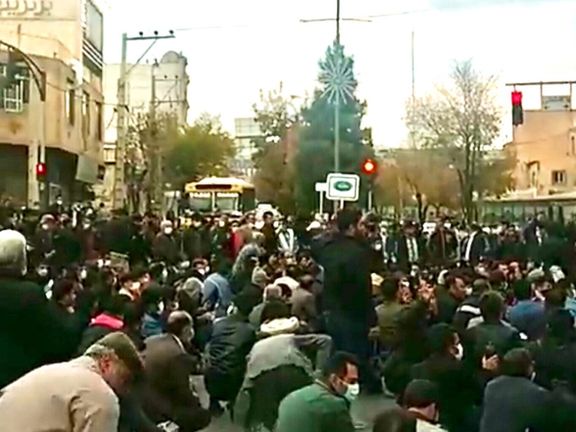
At least four union activists were arrested on the eve of another round of nationwide protests scheduled to be held on Labor Day, May 1, by Iranian teachers.
The Coordination Council of Iranian Teachers’ Trade Associations said that security officers raided the homes of the several activists in Tehran on Saturday, arrested four and confiscated their electronic devices.
The spokesman of the association, Eskandar Lotfi, said in a tweet that three of the detainees were taken to the notorious Evin prison, adding that tens of their other colleagues from different parts of the country have been summoned to court.
According to reports, the officers used violence against some of the activists who resisted arrest, including Rasoul Badaghi, and broke glasses and furniture with a hammer.
During the latest round of nationwide rallies, demonstrators gathered in front of the Education Ministry building in Tehran on Thursday and its offices in various other cities to protest discriminatory regulations on a teacher ranking plan as well as the "continuous and systematic" suppression of union activists.
Teachers across Iran have staged several nationwide protests and strikes in the past six months and have vowed to continue protests until authorities meet their demands including, the implementation of decade-old legislation that would bring the salaries and pensions of 750,000 teachers in line with other civil servants.
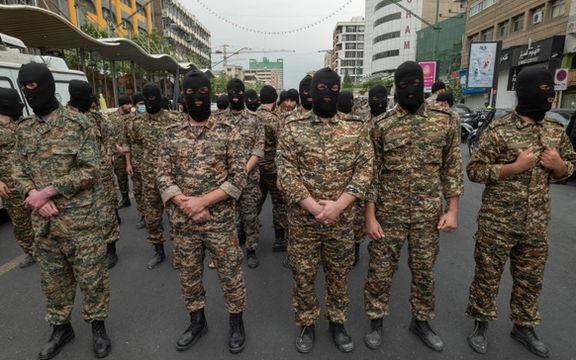
An operative of Iran's IRGC Qods Force held in a European country has admitted to plotting assassinations in Turkey, Germany and France, diplomatic sources say.
The sources who spoke to Iran International on condition of anonymity said the accused who is currently in detention in a European country has admitted to receiving $150,000 for organizing the assassinations with one million promised to be paid to him after the completion of the operations.
The alleged operative has confessed, the sources said, that he was ordered to organize the assassination of an Israeli national who worked at the Israeli consulate in Istanbul, an American general in Germany, and a French journalist.
The identities of the alleged targets and the reason for them being targeted have not been revealed.
Israel’s Haaretz reported following the disclosure by Iran International that Mossad played a role in preventing the assassination of its consulate worker in Turkey.
The revelation comes at a sensitive time when talks to restore the 2015 Iran nuclear deal, JCPOA, have stalled becuase of Tehran's demand that the United States shoudl remove the IRGC from its list of terrorist organizations.
IRGC working with drug cartels
Mohsen Sazegara, a United States-based journalist and political activist, told Iran International that there is a possibility the plots were connected to the Islamic Republic's promise to take revenge against the United States for the 2020 assassination of Qods (Quds) Force Commander Ghasem (Qasem) Soleimani, given that one of the targets of the alleged plots is said to have been an American general.
Soleimani was killed in a targeted US drone strike as he arrived at Baghdad airport on January 3, 2020. Iranian officials have repeatedly vowed to avenge his death.
The sources also said the accused has admitted that he had orders to use drug trafficking contacts to carry out the assassination missions.
Sazegara who was among the founders of the IRGC in 1979 and served in several high government positions in the early years of the Islamic Republic also said that Iranian operatives' use of drug traffickers to carry out operations abroad is not new. "For a long time, the Islamic Republic has worked with drug traffickers. The network of drug trafficking-terrorism extends from Kabul to Caracas," he said.
A special IRGC unit
Diplomatic sources who spoke to Iran International also said the man in charge of the alleged assassination plots was a member of the secretive Unit 840 of the Qods Force. The unit’s mission is to conduct operations against Western targets and Iranian opposition groups and individuals.
There is no mention of Unit 840 in Iranian media. The existence of a such a unit has only been reported by Israeli media which in November 2020 reported that Israeli Defense Forces (IDF) had accused Unit 840 of placing explosives on Syrian border.
Ali Afshari, political analyst based in the United States, told Iran International that in his view the IRGC has evolved into a "gangster, mafia-like organization" from an originally "idealistic Shia Islamic fundamentalist entity."
"The IRGC uses drug traffickers and criminal gangs to be able to avoid being held directly responsible for its terrorist operations," Afshari said.
In December 2020 Turkish intelligence said it had discovered a terror network tied to Iran’s Intelligence Ministry that would abduct or assassinated Iranian dissidents. According to Turkish government's official TRT channel, the network and its 11 operatives were behind the abduction of Farajollah Chaab, the former leader of an Iranian Arab separatist Movement.
Iranian intelligence allegedly lured Chaab to Turkey, abducted him, and with the help of an international Turkey-based drug cartel known as the Zindashti Cartel whisked him to Iran where he was later put on trial.
In 2013 the United States sentenced Iranian-American Manssor Arbabsiar to 25 years in prison. Arbabsiar, a car dealer, admitted to plotting the assassination of the Saudi ambassador to Washington on orders from Iranian military officials. Arbabsiar was arrested after the FBI and US Drug Enforcement Agency became suspicious of his visits to Mexico and contacts with a Mexican drug cartel.
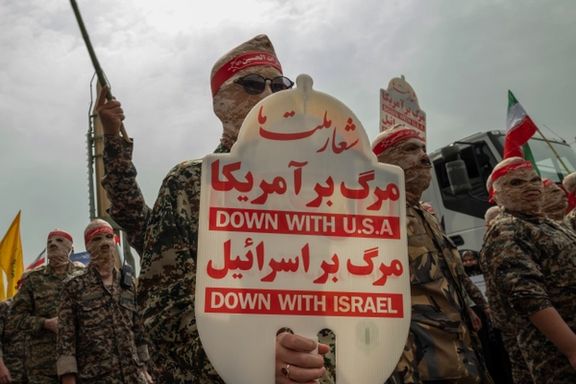
Iranian officials and media have intensified their threatening tone against Israel in recent weeks, especially media controlled by the Revolutionary Guard, IRGC.
“The Zionist media say that just in the past 40 days 15 Zionists have been killed and dozens wounded in a series of Palestinian attacks,” Fars news agency affiliated with the Revolutionary Guard wrote in a report on Saturday.
The language used, such as calling civilian victims of attacks “Zionists”, to justify their killing according to the ideology of Iran’s rulers, is not a new phenomenon, but the obvious triumphant tone in supporting these attacks shows a recent rhetorical escalation.
Fars went on to say, “Just four special operations of Palestinian resistance in only 18 days in March-April took the lives of 14 Zionists and wounded others, creating strong fear in Tel Aviv about a new wave of operations against Zionists.” At the same time, Iranian officials have clearly reiterated their support for ‘Palestinian resistance’ and praised their material support for groups such as the Lebanese Hezbollah.
The unmistakable aggressive tone comes across all platforms, including top leaders of the Islamic Republic, who unleashed a barrage of threatening language in the past few days, as the annual Quds Day approached on Friday.
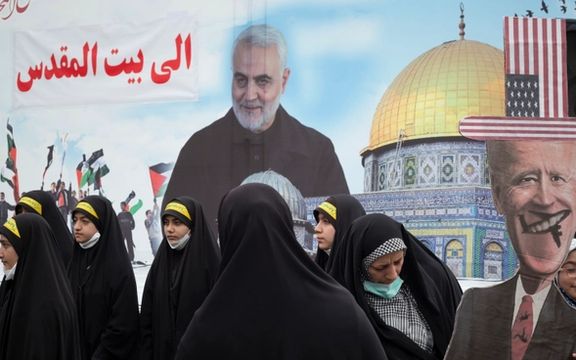
Supreme Leader Ali Khamenei on Friday delivered a speech to mark the Quds Day, launched by Tehran in the 1990s to show its fundamental opposition to the existence of a Jewish state. "Palestinian youth, and the military manoeuvres in Gaza indicate that all of Palestine has turned into an arena of resistence," he said.
Other officials threatened Arab countries who have normalized relations with Israel, with some highlighting that a new solid-fuel missile, Kheybar could reach Tel Aviv in under 10 minutes.
The aggressive public stance comes at a curious time, when the Biden Administration seems to be in an internal debate over whether to remove the IRGC from its foreign terrorist organzation list, as Tehran has been demanding as a pre-condition to reviving the Obama-era nuclear agreement known as JCPOA.
It would be logical to expect that the Islamic Republic would adopt a more cautious public posture not to put the White House in a more difficult position than what it finds itself in, as domestic opposition rises to further concenssions to Iranians.
But apparently Tehran has decided to highlight the fact that it will not change its interventionist regioanl posture, most clearly demonstrated by the role IRGC plays in supporting and arming militant anti-Israeli and anti-Western militants.
The clear signal came not just from Tehran, but all proxy forces in the region chimed in to highlight their anti-Israel ideology.
The Houthis in Yemen, Shiite militia in Iraq and Hezbollah in Lebanon all joined the messaging from Tehran, reiterating their rejection of Israel and echoing the statements by Khamenei and other Iranian officials on Friday.
Hezbollah leader Hassan Nasrallah praised Khamenei for supporting “the resistance”, saying, "What Imam Khamenei said today underscored his serious and firm commitment to supporting Palestine and the resistance movements in the region."
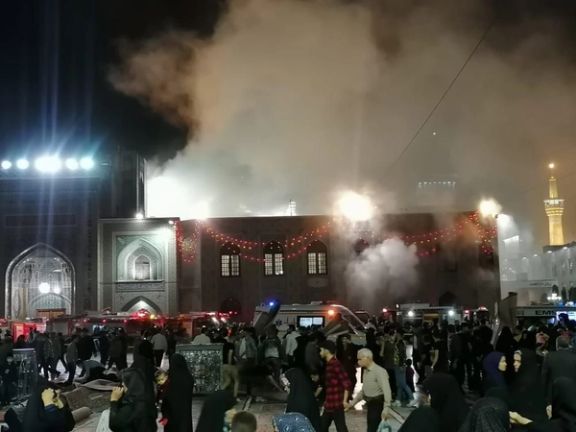
A fire broke out on Friday night in the compound of Iran's largest Shiite shrine in northeastern Iran but was quickly extinguished.
According to IRNA, the fire started from one of the parked cleaning machines in the courtyard of the Imam Reza shrine, the eighth imam of Shiites, in the city of Mashhad in Khorasan-Razavi Province, but fire engines quickly arrived at the scene and put it out.
According to the report, the cause of the incident was under investigation.
An official with the custodianship of the shrine, Mostafa Feizi, said no one was injured in the incident.
He added that the situation in the shrine is back to normal, and visitors face no problems or limitations.
The shrine is the largest religious complex housing a tomb in Iran and one of the country's most-visited sites. It hosts millions of pilgrims every year, mostly Iranians and Shiite pilgrims from neighboring countries such as Iraq and Pakistan.
In a rare incident earlier this month, a man said to be a foreigner, stabbed three clerics in the shrine, killing one of them instantly while another one succumbed to injuries at the hospital. The assailant was arrested, along with four suspected collaborators.
Iranian President Ebrahim Raisi alleged that “one of the deviant agents of American [-made] Takfiri groups” was behind the stabbing attack.
Iranian officials use Takfiri as a vague umbrella term to refer to Sunni militant armed groups and individuals in Iran and abroad.
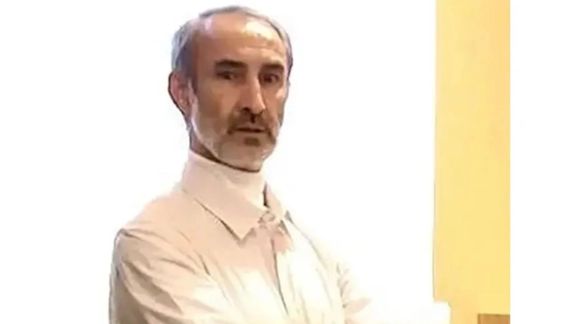
Swedish prosecutors and plaintiffs have requested life imprisonment for Hamid Nouri, a former Iranian official, for his role in prison purges in Iran in 1988.
In the 89th session of Hamid Nouri’s trial on Friday, plaintiffs' lawyers said Nouri played "an active role" in the execution of thousands of political prisoners in Iranian prisons in 1988 and requestedthe court hand out the maximum sentence of life imprisonment for him.
Swedish prosecutors who invoked the principle of "universal jurisdiction" for serious crimes to bring the case to trial submitted their final indictment life imprisonment for Nouri on Thursday.
Nouri, allegedly a former deputy prosecutor at Gohardasht Prison near Tehran at the time of the killings, has been charged with “war crimes, crimes against humanity, torture, and participating in the continued crime of refusing to return the bodies of executed prisoners to their families.” He has denied any wrongdoing and said plaintiffs' allegations were a "completely imaginary story".
Witnesses have told the court that Nouri, who went by the alias Hamid Abbasi at the time, was responsible for handing down death sentences and taking prisoners to where they were hanged or shot.
Following Thursday's announcement of the prosecution's demand for life imprisonment, Sweden's Foreign Ministry advised citizens against making unnecessary trips to Iran, citing increased "expression of dissatisfaction" of Iranian officials over Nouri's trial.
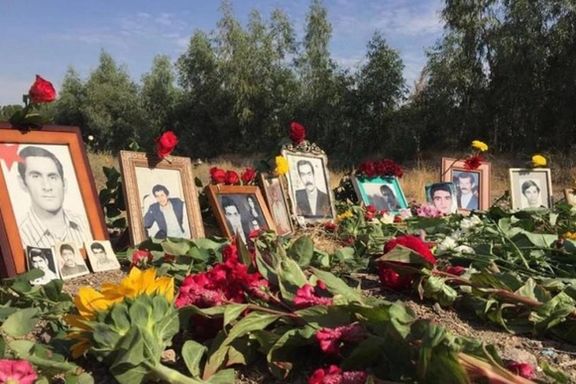
There have been allegations that Iran seeks to exchange Nouri with Swedish-Iranian scientist and academic Ahmad-Reza Djalali arrested on vague charges of espionage and collaboration with Israel in 2016 and sentenced to death in 2017.
Sweden arrested Nouri, now 61, upon his arrival in Sweden at Stockholm Airport in 2019 and in August 2021put him on trial over the mass execution and torture of prisoners at Gohardasht Prison in July and August 1988.
Most of victims were linked to the opposition group Mujahedin-e Khalq Organization (MEK) but there were also some with links to leftist and secular groups such as Fadaiyan Khalq Organization (FKO) and Tudeh Party as well as some Kurdish groups such as Komala and Kurdish Democratic Party of Iran.
Nouri is the first person ever put on trial for the executions carried out on the basis of a fatwa by Iran's then-supreme leader, Ayatollah Ruhollah Khomeini, against the MEK which carried out a wave of bombings in Iran and struck an alliance with Saddam Hussein during the 1980-88 war.
President Ebrahim Raisi was one of the four judges of an ad hoc judicial committee formed to carry out the fatwa which came to be known among prisoners as the ‘Death Commission.’
The committee decided the fate of prisoners in secretly held summary trials. Raisi has denied any role in the sentences but has at the same time said the action taken against the MEK was justified due to their acts of violence.
Some of the prisoners who were subsequently executed had been freed from prison much before the prison purge but were rearrested and put on trial again to ensure they truly denounced the MEK and were "sufficiently repentant".
The exact number of prisoners executed during the purging of prisoners in 1988 is not known but according to Amnesty International, the Iranian authorities "forcibly disappeared" and "extrajudicially executed" around 5,000 between July and September 1988.
The MEK’s National Council of Resistance of Iran in 2019 named over 5,000 members as victims in a booklet ‘Crimes Against Humanity.